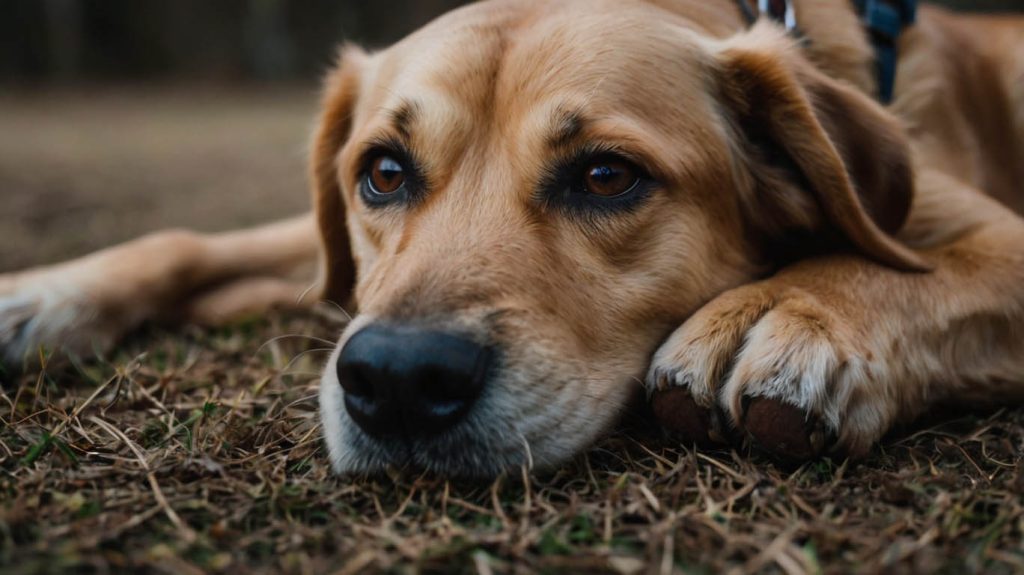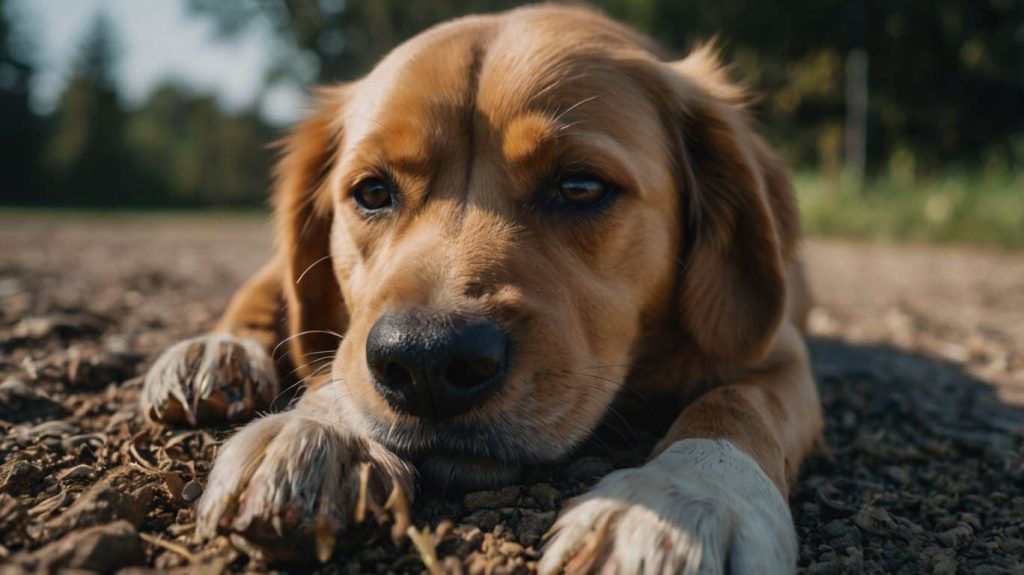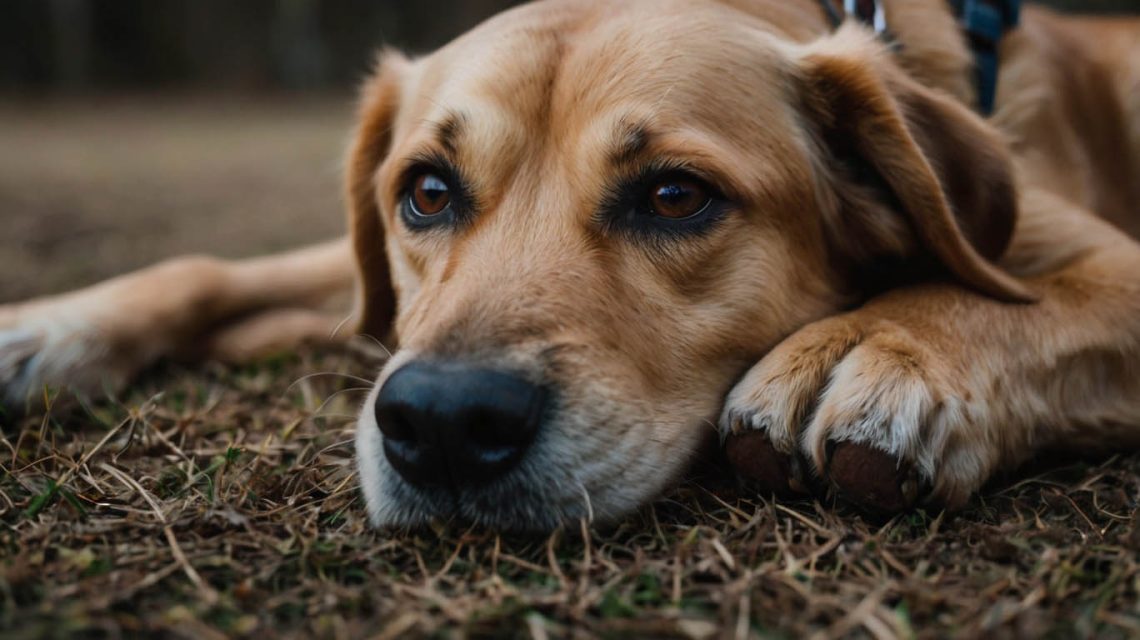Why Does My Dog Constantly Lick His Paws: The Ultimate Guide for Worried Owners
The house is quiet. You’re relaxing on the sofa after a long day, and then you hear it—the unmistakable, persistent “slurp, slurp, slurp” of your dog intensely licking their paw. At first, you dismiss it as normal grooming. But then you realize it’s not just a quick clean. It’s constant, sometimes even frantic. You see them gnawing and chewing, and you notice the fur between their pads is now stained a reddish-brown. Consequently, a deep sense of worry begins to set in, and you find yourself asking the critical question: why does my dog constantly lick his paws?
If you’re in this situation, you are right to be concerned. While occasional paw licking is normal, obsessive licking is a big red flag that something is wrong. It’s your dog’s way of telling you they are uncomfortable, in pain, or distressed. Therefore, this guide is designed to help you become a detective. We will explore the common culprits, from medical issues to behavioral triggers, and provide a clear action plan to help you get to the bottom of the issue and bring your best friend much-needed relief.
The Investigation Begins: Why Does My Dog Constantly Lick His Paws?
Unraveling this mystery requires looking at both physical and psychological causes. In the vast majority of cases, the root cause is a medical issue that needs to be addressed.

Medical Reasons: The Most Common Answer to “Why Does My Dog Constantly Lick His Paws?”
Physical discomfort is the number one driver of excessive paw licking. Your first step should always be to consider these potential medical problems.
1. Allergies: The Leading Culprit
This is, by far, the most frequent cause of itchy paws. Unlike humans who get watery eyes and stuffy noses, dogs often experience allergies through their skin, and their paws are a primary hotspot.
- Environmental Allergies (Atopy): Your dog could be allergic to things they walk on or inhale, such as pollens, grasses, molds, or dust mites. This type of itching is often seasonal, getting worse in the spring or fall.
- Food Allergies: A sensitivity to an ingredient in their food, most commonly a protein like chicken or beef, can cause system-wide itching that manifests in the paws.
- Contact Dermatitis: This is a reaction to something their paws have directly touched, like harsh floor cleaners, road salt in the winter, or chemicals in the grass.
2. Pain or Injury
A dog’s instinct is to lick a wound or a source of pain.
- Foreign Body: There could be something lodged between their paw pads—a thorn, a sharp pebble, a sliver of glass, or even a pesky foxtail.
- A Cut or Abrasion: Check their pads for any cuts or scrapes they may have gotten on a walk.
- A Broken Toe or Nail: This can be extremely painful and will certainly lead to licking.
- Arthritis: In older dogs, arthritis in the joints of the paw or “wrist” can cause an aching pain that they try to soothe by licking. The question “why does my dog constantly lick his paws” is very common among owners of senior dogs.
3. Parasites and Infections
Tiny pests or secondary infections can create an intense itch.
- Parasites: Fleas, ticks, or mites can all cause severe itching. While you might think of fleas on a dog’s back, they can and do bite their feet.
- Secondary Infections (Bacterial or Yeast): The constant moisture from licking creates a perfect breeding ground for bacteria and yeast. This is often the cause of that “Frito feet” smell and the reddish-brown staining of the fur (caused by saliva). The infection then makes the paws even itchier, creating a vicious, self-perpetuating cycle.
Behavioral Causes: When Paw Licking Isn’t Physical
If your veterinarian has ruled out all medical causes, the licking may be behavioral.
1. Boredom and Lack of Enrichment
A smart, energetic dog with nothing to do may start licking their paws simply to pass the time. It can become a self-soothing, mindless habit.
2. Anxiety and Stress
Licking can be a displacement behavior for a stressed or anxious dog. It’s similar to a human nervously biting their nails. Triggers can include separation anxiety, a new pet in the home, loud noises like thunderstorms, or a general feeling of insecurity.
3. Compulsive Behavior
In some cases, paw licking can become a true obsessive-compulsive behavior. The initial cause (like an allergy) may be long gone, but the dog has learned that the act of licking provides a small release of endorphins (pleasure chemicals) in the brain, making it a difficult habit to break.

Your Action Plan: How to Help When Your Dog Constantly Licks His Paws
Now that you understand the potential causes, here is a step-by-step plan to address the issue.
The Non-Negotiable First Step: Visit Your Veterinarian
You cannot solve this problem on your own. Because the majority of cases have a medical root, a thorough examination by your vet is essential. They can perform tests like a skin scrape to check for mites, a cytology to look for yeast or bacteria, and allergy testing. Do not skip this step. Trying to treat a medical issue with behavioral solutions will not work and will only prolong your dog’s suffering.
Immediate At-Home Soothing and Management
While you are waiting for your vet appointment or for treatments to work, you can provide some immediate relief and prevent further damage.
- Clean Their Paws: After every walk, gently wipe your dog’s paws with a damp cloth or a hypoallergenic, unscented baby wipe to remove potential allergens.
- Use an E-Collar (The “Cone”): While no one loves the cone of shame, it is the most effective way to physically prevent your dog from licking and allow the irritated skin to heal.
- Soothing Paw Soaks: You can ask your vet about soaking your dog’s paws in a cool solution of water and povidone-iodine (it should look like weak iced tea) or a special medicated shampoo. This can help to clean the paws and reduce inflammation.
Long-Term Solutions for a Paw-Licking Problem
The long-term solution will depend on the diagnosis from your vet.
- For Allergies: This may involve allergy medication (like Apoquel or Cytopoint), a prescription diet for a food trial, or regular medicated baths.
- For Boredom: Increase their daily exercise and provide mental stimulation with puzzle toys, snuffle mats, and training sessions.
- For Anxiety: Work on building their confidence with positive reinforcement training. For severe cases, a veterinary behaviorist may recommend anti-anxiety medication in conjunction with a behavior modification plan.
A Quiet Paw is a Happy Paw
The answer to “why does my dog constantly lick his paws” is almost always a cry for help. That persistent licking is a symptom of an underlying problem that needs your attention. By working with your veterinarian to identify and treat the root cause, you can break the cycle of itching and irritation. You can give your dog the comfort they deserve and finally bring peace and quiet back to your home.
What have you discovered is the cause of your dog’s paw licking? Share your story and what has worked for you in the comments below!


